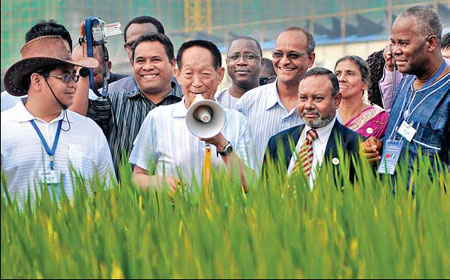Society
- Details
- By David Cao
- Hits: 933
At a time of rapid climate change and urbanization, agricultural professionals are calling for countries to work together to ensure the safety of the world food supply.
"The demand for food has increased significantly in recent years, mainly because of population growth and advanced urbanization," said Nie Fengying, a researcher at the Chinese Academy of Agricultural Sciences.
"At the same time, the risks to food supplies, especially those in poor areas, are becoming increasingly great, partly because of climate change and soaring prices," she said.

Yuan Longping, a leading agriculture expert, shows foreign guests the famous hybrid rice that he developed. The rice plant produces a much higher yield than other varieties. In recent years, China has strived to become capable of producing by itself all of the grain that it consumes and to increase its grain production.
- Details
- By David Cao
- Hits: 725
Villagers living near a mega prison in Central China's Henan province said they were living in fear two days after a prisoner escaped.
Dong Yunhai, a 23-year-old convict, escaped from the Yubei Prison in northern Henan early on Tuesday, Wang Guangxing, a publicity official with the provincial prison management bureau, told China Daily on Thursday.
Wang declined to provide details about the prison break because police were still investigating. Posters describing Dong appeared on Tuesday on the walls in villages around the prison, locals said.
"I'm very afraid," said Bao Rongxiang, who was in his 50s and lived in Lucun village nearby. "After sunset we keep our doors locked and don't dare to go out."
- Details
- By David Cao
- Hits: 924

The malls and markets of Beijing have taken on a spooky tone in preparation for Halloween, which has gradually become more popular in China, despite cultural barriers and differences.
For 26-year-old Li Ye, the festival represents a chance to relax and have fun.
"It is fun to have friends around to celebrate the festival, but even strangers can have fun together," Li said.
In Sichuan province, barrowners have plastered their places of business with Halloween-themed posters, fake blood and other trappings as the holiday approaches.
- Details
- By David Cao
- Hits: 694
Thai police have arrested 9 people on suspicion of killing 13 Chinese sailors in the Golden Triangle on Mekong River earlier this month, Zhang Xinfeng, China's Vice-Minister of public security, said Friday.
Zhang declined to identify the suspects, saying further investigation is under way. He made the announcement after meeting Thai police chief Pol Gen Priewpan Damapong.
Read more: Nine Thai Soldiers arrested for killing Chinese sailors
- Details
- By David Cao
- Hits: 723
Seven coal miners have been confirmed dead and 11 others are still missing after a sudden release of pressurized gas sent tons of coal flying and blocked the mine shaft in Jiaozuo of Central China's Henan province, the local safety watchdog said on Thursday.
The sudden release of gas - called an outburst - occurred at 12:36 am on Thursday at Jiulishan Coal Mine when 18 miners were working underground. The 18 workers entered the pit just half an hour before the accident, according to the local government publicity office.
Rescuers had found the bodies of seven miners as of Thursday night and the location of the 11 missing workers cannot be determined, Zhang Feng, chief engineer of the rescue team.
More Articles …
Page 61 of 255